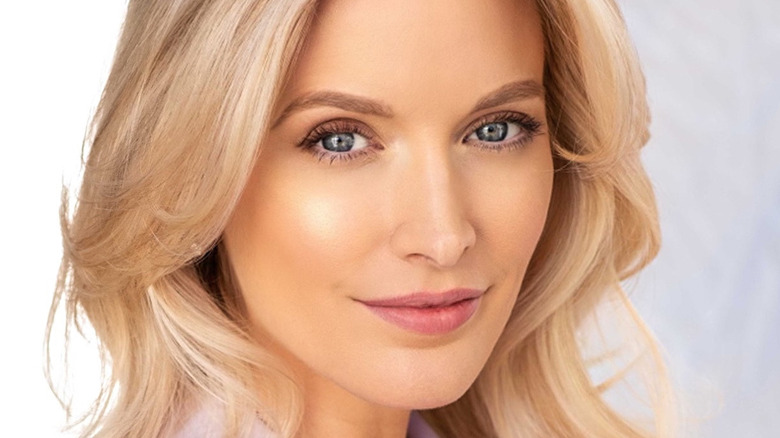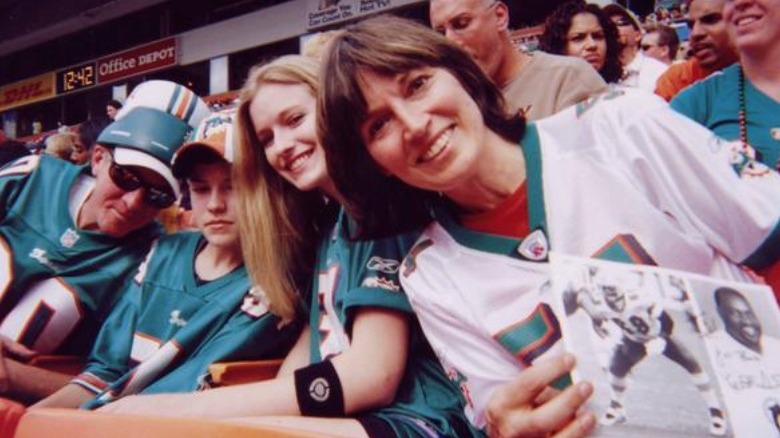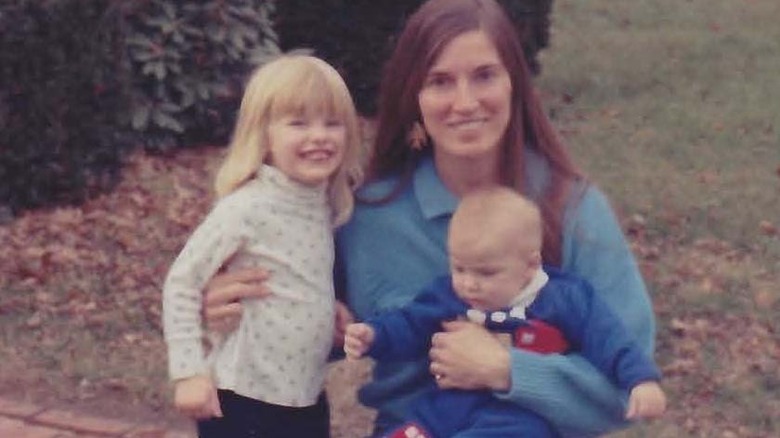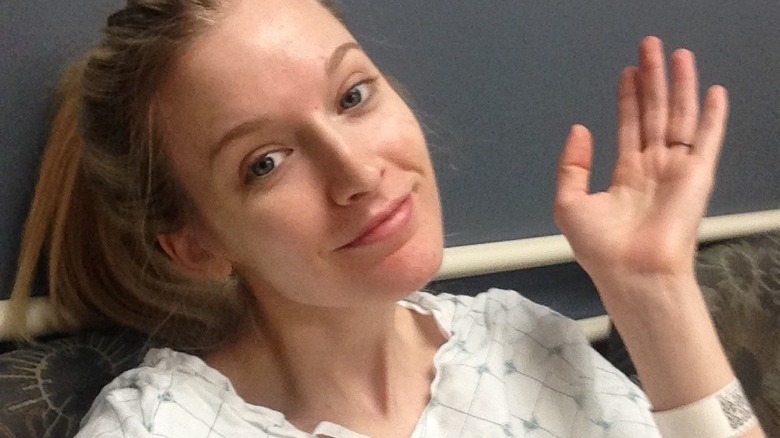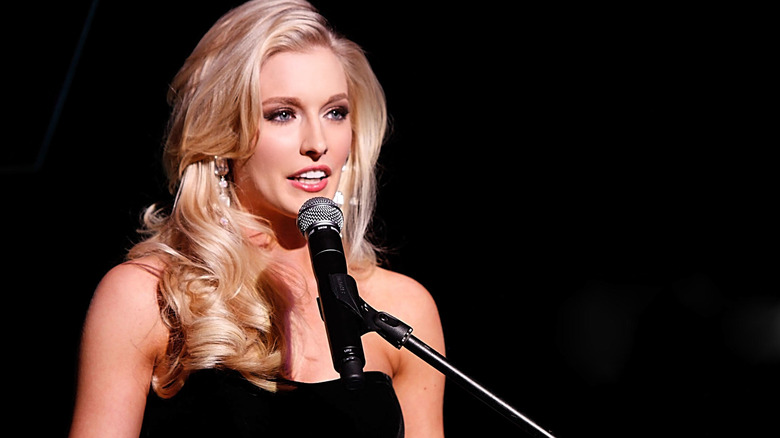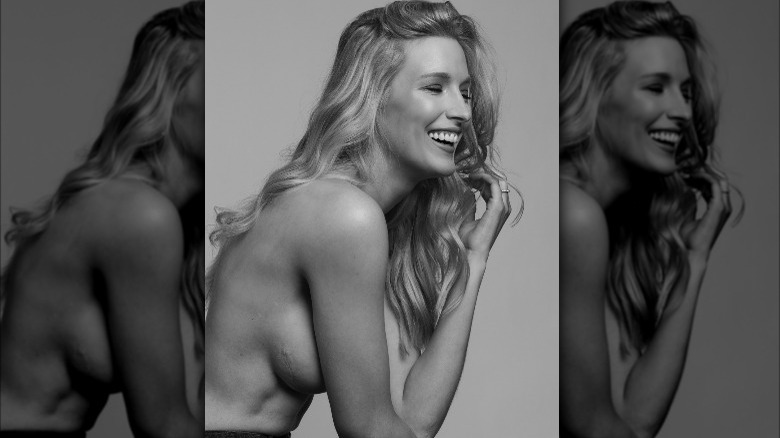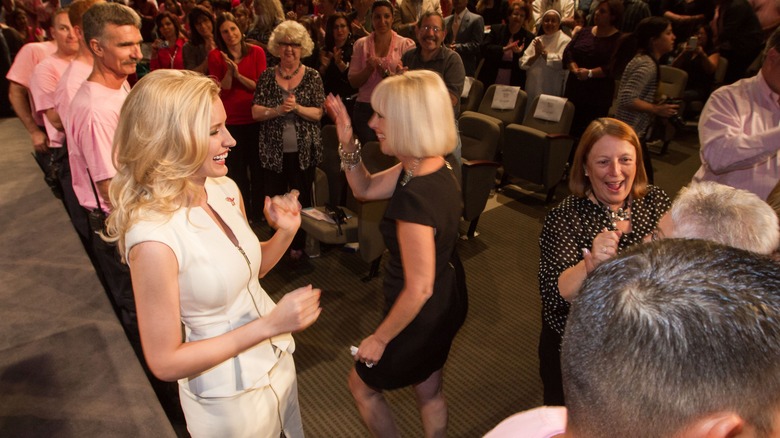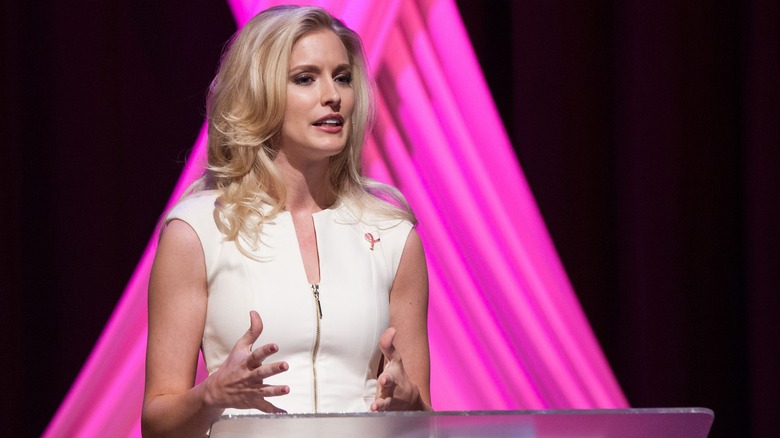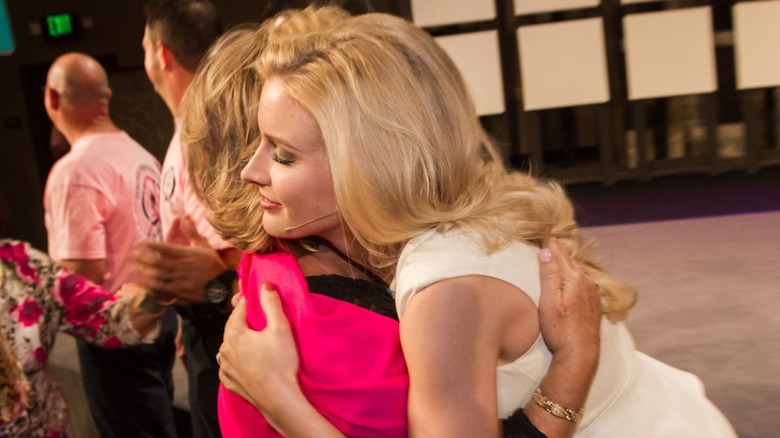Allyn Rose Opens Up About Undergoing A Prophylactic Double Mastectomy - Exclusive Interview
Allyn Rose knew she was entering the spotlight after being named Miss District of Columbia in 2012 and competing for the title of Miss America in 2013. However, she wasn't expecting to go viral for something other than the pageant. Within weeks, word spread about her decision to undergo a preventative double mastectomy after losing her mother, grandmother, and great aunt to breast cancer.
This decision wasn't an easy one for her to make, especially while the world was watching. Everyone — even people she didn't know — seemed to have an opinion on what she should do with her own body, but their doubts didn't alter her choice to choose surgery to potentially save her life down the road.
She's since become the first woman with a mastectomy to model for Sports Illustrated. She's gotten married, she's become a mother, and she's set herself free from the fear of having cancer. Looking back, the preventative procedure has been one of the best decisions that Rose has ever made. Now, seven years later, she continues to publicly share her story in hopes that it will save even just one other life.
In an exclusive interview with Health Digest for Breast Cancer Awareness Month, Rose opened up about what ultimately led to her decision to have a preventative double mastectomy, the emotional toll she experienced behind her health journey, and how she hopes to change the narrative and erase the unknowns for others in similar situations with her platform The Previvor.
Why she decided to undergo a preventative double mastectomy
Your father is the first one who suggested that you consider a preventative double mastectomy when you were 18, which you were initially against. What was it that made you change your mind and later want to receive one at age 26?
It was getting a little bit older and gaining some long-term perspective. I had that really difficult conversation with my father when I was 18 and pushed back.
One of the motivating factors was, on my 18th birthday, my aunt gifted me some journals that my mother had written growing up and as my mom was becoming a new mother, and she detailed what it was like to battle breast cancer the first time, hav[ing] a recurrence. She talked in great detail about having to leave her most precious job of raising her children unfinished and what that fear was like. It's going to make me tear up.
As a mom, knowing what it's like to have a little girl, I can't imagine what it would be like to be a mother and to know that you're going to die, and you have to leave all the wisdom and guidance in your kids that you can in such a short period of time.
Even though I received those when I was in my late teens and I read through them in my early 20s, it took me a long time to get through them all. It changed my perspective on things and made me realize that I didn't necessarily have the luxury of my youth, and I needed to be proactive. My mom was 27 when she was diagnosed for the first time, and as the years went by, I was getting closer and closer to that age. It put a little bit of the pressure and the heat on knowing that the clock was ticking, so to speak.
Her experience with genetic testing
Did you have any genetic testing done? Did that factor into your decision at all?
I did have genetic testing. I was pretty certain, based on the health history that my mother had left me and conversations I'd had with my father.
My mother was breast cancer gene mutation negative, for BRCA1 and 2, but I did have breast cancer run on both sides of my family. I decided to be tested to make sure that my mother didn't have a false negative and that perhaps I didn't carry it from my father's side.
Funnily enough, the results came back negative for every known cancer marker. I thought, "Wow. This is so crazy to have such a strong family history of, not only breast cancer, but numerous other cancers in my family, and we really don't have the mutation."
After talking to an oncologist and a breast surgeon, they said to me, "You likely have something, and we can't test for it yet. We're certainly advanced when it comes to the amount of genes that we can test, and we can map the human genome now, but there's always going to be questions out there and new developments that are made." Based on the risk assessment, I knew it was the right decision for me to undergo a prophylactic surgery.
The unexpected aspects of recovery
Was there anything you hadn't initially anticipated that surprised you about going through that type of procedure?
Certainly. The recovery was a lot more difficult than I expected it to be, not only from a physical standpoint, but from an emotional standpoint. I've always been a fairly positive person, and I go into things saying, "We're going to have the best possible outcome. We're going to come out on the other side with flying colors." After the surgery, you realize, "Wow. Your body is very different."
I did a two-stage procedure, where the first was the mastectomy where they remove all of my breast tissue, and then they put tissue expanders underneath my chest wall, and over time, they fill those up with saline until you get to the point where you say, "That's back to normal or where I'd like my breast size to be."
This was over a three-month period, so it was a three-month period of feeling deformed, not knowing if my body was ever going to look the same again, or if I was ever going to feel the same again.
At the time, I wasn't married, I didn't have any children, and I was thrust in the same position that my mother was, thinking, "What is life going to be like moving forward now?" From an emotional standpoint, it was very difficult healing.
There are also a lot of physical things that come with having a mastectomy. You lose sensation in your breast, things change, the size is different, and the texture is different when you move around.
We have a thing in the community called "animation deformity," where if you do a pull up or a push up, the chest muscles are pulled over the implant, and you look a little bit deformed. Dealing with all of those things about my body that were different was quite a challenge.
Everyone has had an opinion about her body
You've previously said that you received hate mail for your decision to undergo this procedure. Is that true?
Yeah, that was a really interesting part ... The hate mail thing was really wild. The first messages came to me. There was a lot of crazy people trying to tell me that I was making the wrong decision.
You've got these really wacko medical people out there, tell[ing] me that you can heal your cancer with herbs and teas and salves and things like that.
A lot of men reached out to me unsolicited to tell me that I was mutilating my body, and how dare I, and this was a terrible decision, and I would regret it.
My poor father even received a few emails. One thing I remember in particular, which is really wild, is he got one of those serial killer letters in the mail, the ones where people cut out letters from a magazine and paste it all together, one of those things you see in the movie, talking about how he was a horrible father. They couldn't believe that he would encourage his daughter to mutilate her body.
The crazies came out of the woodwork. The one cherry on top was the Westboro Baptist Church tweeted at me, and these are the same people who rioted at military funerals and things like that, to tell me that God was sending me cancer for mutilating my body, and that Angelina Jolie and I were terrible people.
I said, "You know what? If you're pissing off the Westboro Baptist Church, you're probably looking in the right direction."
Looking back at that experience, what would you want to tell people who don't understand why preventative surgery is necessary?
That's a tough question. If they're concerned, it's probably because they haven't done their research to know what an incredible option this is for women and men who face a genetic mutation to breast cancer or a strong family history to breast cancer.
I'm really fortunate to live in a technological age where reconstruction is possible, and you can reconstruct in a meaningful and beautiful way, which was not the option for my mother when she was in her late 20s and having to undergo a mastectomy. She had breast cancer, she had to do [radical] radiation, which completely destroyed all of the tissue in her body, made it impossible for her to ever reconstruct her breast, and she had to live her entire life with one breast.
I feel very fortunate that I was able to have a wonderful surgical team and to have a body where, if anyone were to look at me or [I am] looking in the mirror, a mastectomy feels like a distant memory, and no one would ever know because of the skill of my surgeons and the advancements that are available for women now.
On how the world needs to rethink their perspective on beauty
You gave a TEDx Talk on redefining society's meaning of breasts. Coming from a modeling and beauty queen background, how do you feel like your perspective on beauty has changed since undergoing a double mastectomy?
I was a pretty unconventional pageant contestant. It wasn't something that I had ever imagined for my life. I grew up a real tomboy, played guitar in a punk rock band, and was not the person graduating high school where they said, "This girl's heading off to Miss USA."
Going into the industry, I had a different perspective from other competitors and people who had worked most of their lives in the beauty industry. I realized that this was a means to an end. It was a wonderful opportunity.
I also realized that how you look and the way that you feel about yourself directly impacts how you interact with the world. Undergoing a surgery like this, you realize, no matter how much you think, "It doesn't matter. The way that I look isn't important," when you wake up and things are different and you have to face the world with a different body, you realize how important it is.
I don't think that it's necessarily a vain thing to care about the way that you look, but it shouldn't be the central focus. [My] focus was being alive. It was to save my own life, to be here for my future children, for my future husband, and my family. I had to put the way that I looked, or, at least, the way that I could look in the future, on the back burner for the more important reality.
The importance of performing monthly self breast exams
You're a big advocate of monthly self exams and encouraging people to do those each month to potentially catch cancer early with the #SelfExamGram. What is the biggest myth or misconception you hear most about performing these self exams?
I don't think there's any real misconceptions, but what is always interesting to me is how fearful women are to do them. It's because no one ever teaches us how to do a proper self breast exam. The name is a misnomer. It comes across like it should be self explanatory, but it's really not. It's simple, but only once you've learned the steps and what to do.
I have a lot of women slide in my DM's every month, a little bit embarrassed, saying, "I see these reminders all the time. I know I got to do a self breast exam. When I'm in my doctor's office, she reminds me to do it, but I don't know how."
After getting a lot of these messages, that's when I started changing the way that I was communicating on my social media platform, saying, "It's one thing to remind women, but it's another thing to teach them how to do it."
That's a life skill, the ultimate form of self care that you can take with you your entire life. It's the first line of defense against breast cancer. Most women find their own breast cancer, and they either do it by accident or through something like a self breast exam.
What are some crucial tips to keep in mind while performing a monthly self breast exam?
A lot of the aspects of having a self exam: When you feel your breast, a natural breast is lumpy and bumpy. It changes throughout the month, so it can be a little bit intimidating for women when they dive right in, because they don't know what breast cancer feels like. They don't know what feels bad, what feels normal, and so it's learning those little tips.
You should be doing your self exam a week after your period, because that's when your body is at its most stable state, where you're not having any swelling or hormonal changes. You're going to want to repeat that at the exact same time once a month. A week after your period [is] the most ideal time to make sure you're doing it — every four weeks.
[You should be] getting to know what's normal for your body. That's what I always preach: Once you know your normal, you know when something changes.
People also don't tell you what cancer feels like, and it can be different from body to body, but there are certain little tips and tricks where you can identify [and say], "This is a scary feeling, lump and bump here, and I should probably call my doctor and get a second opinion."
How The Previvor helps people advocate for their health
You've also created your platform The Previvor to educate people about breast health. What's one of the most important things that you've learned since its inception that you think everyone needs to know?
Putting together the platform and learning a lot myself through the research is: Knowledge is really power, and when you take away the fear of the unknown, women are able to go into challenging things like mastectomy and reconstruction from an empowered standpoint.
I had realized over the years working in the advocacy space, and having women reach out and ask me about these things, that nobody had put together a comprehensive resource for men and women to learn about their options for mastectomy and breast reconstruction. It was mind blowing to me that you had to have a PhD in Google to find out what the choices were.
Women would go to their doctors' offices, and the doctor would only recommend what they specialized in instead of what was necessarily the best for the woman's body type, or lifestyle, or personal preference.
I started seeing things, like women who would either have breast cancer or have a mastectomy for a prophylactic reason, and they'd say to their doctor, "I don't want to reconstruct my breast. I want to have what's called an aesthetic flat closure. I don't want to have breasts anymore. I'd rather not deal with it."
They'd wake up from surgery with breast implants, and their doctor would say, "I knew that you would regret it, so I gave you breasts anyway."
I wish that this was a myth, but it's not, and it's happened to women across the country. I said, "No more. There has to be some sort of platform, and if it doesn't exist, I'm going to build it."
It serves as a resource for women to be back in the driver's seat of their healthcare choices, able to bring a platform like The Previvor into their office, and say, "If you're not willing to give me what I want, then I'm going to find a doctor who will." I cannot believe that these stories exist and that there are people who would do that to patients. It's mind blowing.
Allyn Rose shares the legacy she hopes her story leaves on the world
What is the lasting legacy that you hope both your story and The Previvor leave on the world?
The legacy that I hope that leaves is that it puts women in a better position than I was when I started it.
It was a terrifying thing to have to, not only make the decision to undergo a mastectomy prior to having breast cancer, but to be a young woman where the way that you look and how you face the world is so vitally important to your self identity, I wished that there had been some resource for me going through the surgery, preparing for it, that would've made me feel empowered.
I had to join Facebook groups, be in support groups with women who were 60 years old, completely in a different stage of life than me; their body types weren't the same. The only thing that brought me some peace of mind was one woman who was a little bit younger [and] willing to share photos and videos of what her procedure was. I said, "Finally, someone who looks like me, who can take away a little bit of this fear and anxiety."
I wanted to create a platform for women where they could go learn about all their options, feel empowered, and know that they were making the right choice for them. If you're armed with all of the information, then at the end of the day, you're going to be much happier with the decision that you make.
For my personal platform, I'm already living the success story. When I first went public with my decision to undergo my surgery, I always talked about my future children and my future husband. It's going to make me tear up now, but my little baby is sleeping in the other room, I have a wonderful supportive husband, I have a beautiful life, and it's a life with no fear of breast cancer.
That is a very cathartic feeling to know that I saved my own life, and I've done absolutely everything to, not only prepare my body and my health to be here as long as possible for my family, but to also position my children in a place where they aren't going to have to live in fear.
The Previvor is the first fully comprehensive platform for everyone to learn about breast health. Visit their website to learn about genetic testing, mastectomies and reconstruction, IVF and fertility, how to support a family member or a friend, and more. For reminders to perform monthly self breast exams, follow Allyn Rose on Instagram @allynrose.
This interview has been edited for clarity.

